BY BETH DAY
Aaaand done.
I snapped my laptop shut after a long day of work—organizing, and planning for my wedding day—which would take place in just one week. In the morning, I would fly to South Carolina to help my fiance, Joseph, pack the moving truck with the remainders of the furniture and belongings he hadn’t already sold or given away. I would help him drive the moving truck, cars, and his four daughters back to Arkansas to move in with me and my four kids.
The work that Joseph and I had done over the last eight months since our engagement felt Herculean. A Doctoral hooding. (Joseph’s) A new job. (Again, Joseph’s) Two high school graduations. Three college applications and admissions. A home renovation. New rooms, new schools, new dentists, new doctors for all four of Joseph’s girls. A new townhouse purchased and furnished for our college kids to live in. And the sale of one of my investment properties to fund it all. (Sacrificing the golden goose, I called it.)
Super Man and Wonder Woman, united at last. We had done it all ourselves. Now, one more big push—a cross-country move—and in a week we would be walking down the aisle.
It was at that very moment of closing my laptop that my right leg began to throb. Lightly at first. But as I walked to my bedroom to finish packing my suitcase for an 8:00 am flight the throbbing began to intensify. It was a deep ache that extended from my lower back, through my right hip and coursed down my leg to my knee. I hurried to ready myself for bed, stopping every few minutes to stretch. By the time I finally laid down, I was beginning to worry a little. But I talked myself out of the anxiety.
I did fall asleep fairly quickly—my exhaustion trumping the pain. But a few hours later, the throbbing woke me with breathtaking, mind-blowing intensity. I had never felt anything like this. Not even when I gave birth. I tried to move, but the ache was now a vice grip on my hip flexor and I found that when I tried to lift my leg, I couldn’t. Panic set in. I was supposed to be on a flight in just a few hours. I was supposed to help Joseph move tomorrow.
I inched my hips towards the edge of my bed, rolling through the excruciating pain and sliding my knees to the floor. I knew I had a little bottle of leftover Oxycodone—a powerful narcotic leftover from a past procedure. It was strong stuff, so I kept it hidden in my underwear drawer for emergencies only. I just needed to make it across the bathroom, into the closet and back again—crawling if necessary. But every time I tried to inch my right knee forward, another wave of nauseating pain hit me. I began to moan and cry out each time a new shock of pain surged down my leg. Ow! Ow! I whimpered quietly as I began to drag my leg behind me.
I wanted to scream. Help me! Please someone help me! But there was no other adult in the house. And I didn’t want to wake or scare the kids. So I made my way, one anguished inch at a time to my closet, where I found that blessed, blessed little bottle of Oxycodone. Four little tablets remained. The return trip was just as bad, but somehow I dragged myself back up onto the bed using my good leg. Then I swallowed one of the four tiny white pills, and lay back down, massaging my hip and leg and waiting for relief.
The next morning I texted Joseph. “I think this is sciatica.” I had never experienced sciatica before but the symptoms matched the WebMD description perfectly.
“Can you even get on an airplane?” he asked.
“I can’t even stand up.” I answered, adding, “I don’t think I’ll be any good to you.”
“I think you better cancel your flight,” he replied.
I hated to admit it, but I knew he was right. Wonder Woman wasn’t going anywhere. I cancelled the flight. I called my mom and my best friends. I called my chiropractor and my acupuncturist. And I doled out the rest of the Oxycodone over the next two days like a soldier’s last rations, all the while imagining myself being rolled down the aisle in a wheelchair.
The next day, my good friend Dana came to visit.
“How’s the invalid bride?” she asked wryly.
“Not good.” I answered as I lay outside on the back patio loveseat, my leg stretched out and cradled by another chair. “How am I supposed to dance at my wedding if I can’t even stand up for more than a few seconds?”
She looked at me with one of those maddeningly knowing smiles that you see on buddha statues then said, “You know this is spiritual, right?”
“Well, I’m pretty sure it’s my sciatic nerve.”
“Which is part of your lower back, which is a symptom of the spiritual feeling of not being supported.”
I winced. This was a sensitive subject for me. Ever since the collapse of my faith in the Mormon church ten years previously, I had wrestled with this whole spirituality thing. Not wanting to simply swap one myth for another, I avoided organized religion altogether. Not only that, I viewed anyone who billed themselves as a guru or a spiritual leader with suspicion and kept them at arms length.
Except for Dana. She was first and foremost a friend, but she was also what I would call a “trusted advisor,” whose unassuming blend of transpersonal psychology and Body Keeps the Score made sense to me.
“I think you need to go back in,” she concluded.
And she didn’t mean go back inside the house. What she meant (for those of you who are uninitiated to the winks, nods, and cryptic language of the psychedelic community), was a mushroom trip. An inner journey.
This I could accept as good advice.
I had my first mushroom trip in 2019, and it was pretty much a classic pyschedelic journey. I experienced my own birth and my own death (which was surprisingly peaceful), lost my fear of death, dealt with a little bit of my trauma (which I would continue to do in future sessions with the medicine), saw some pretty colors and fractals, and for weeks afterwards, enjoyed the benefits of a major brain reboot, including increased focus, clarity, stability and productivity.
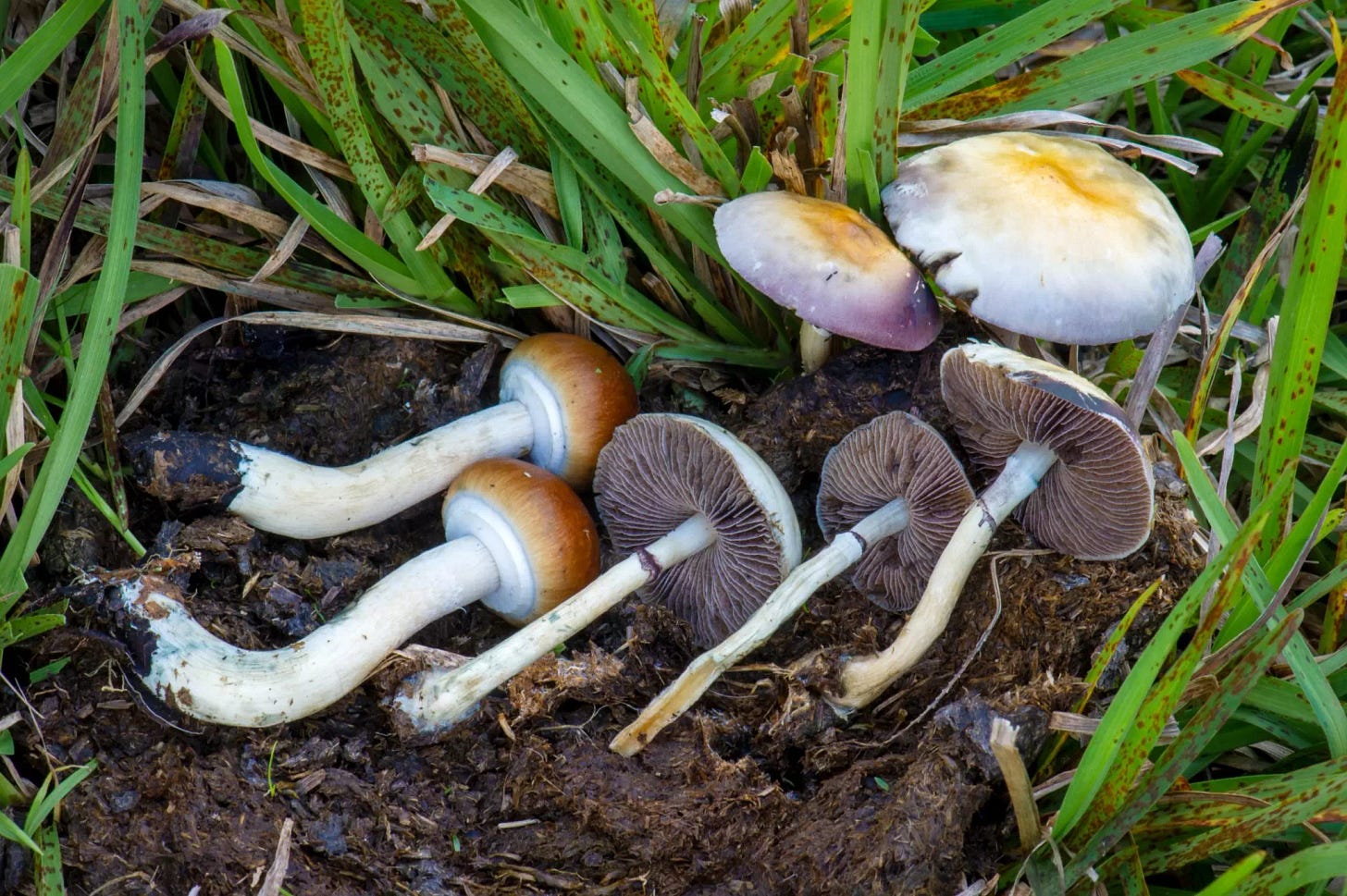
Since that first trip I had “gone back in” only as needed. Mushrooms are not habit forming. But I still suffered with occasional bouts of anxiety, panic attacks, and depression. Part of it was related to the religious trauma I experienced leaving the Mormon church. A larger part of it was the ongoing stress of single parenting with a hostile coparent combined with PTSD, a lovely little parting gift from my ex-husband. Each time I went back in, my mind came out feeling like a ski slope after a big snowfall. Smooth. Delightful. Quiet.
This was my medicine. I had tried cannabis a few times, with lackluster results. And by lackluster, I really mean that every attempt I made at recreational or therapeutic use was a disaster. Either I took too little, or too much, or it made me paranoid, or sleepy, or unable to carry on a simple conversation. Inhaled. Ingested. Indica. Sativa. It didn’t matter. None of it did me a lick of good and I came to accept that cannabis was just not my medicine.
But mushrooms helped me every single time. Dramatically. My panic attacks and anxiety diminished. I worked out my anger at the church and at my ex. And I had really begun to make my peace with the divine force that seemed to pulse through all of nature, and which I could sense as a reality in that altered state.
I had also begun to sit with other friends who saw my improvements and wanted to try it themselves. I had been a birth doula for over a decade in my twenties and thirties, and I found that the skills and ethics of labor support transferred nicely to psychedelic support. As word spread from friend to friend, I found myself often spending the days when my ex had the kids sitting with people in altered states. I never charged for my time. Mostly because I was grateful for what the medicine had done for me, and I felt a deep desire to engage in the work as an act of reciprocity. But also because of its legal status.
Even though mushrooms containing psilocybin (along with several other plant medicines like Ayahuasca, Iboga, and Cacti containing mescalin) are still classified as Schedule I drugs as defined by the Controlled Substances Act, (and don’t get me started on the abysmal and infuriating history of the CSA and the War on Drugs), I knew a lot of people in my hometown who regularly imbibed with impunity. I had read “How to Change Your Mind,” by Michael Pollan, and he seemed to be able to get away with it. Not to mention celebrities like Joe Rogan, Tim Ferris, Kristen Bell, Mike Tyson, Aaron Rodgers, Susan Sarandon, Sting, and Prince Harry. And I figured, if Tracey Tee, founder of “Moms on Mushrooms” wasn’t in jail by now, the government must not be super interested in cracking down on otherwise law-abiding, contributing members of society.
Don’t get me wrong. I knew I had to keep it a secret. But I also knew that I was a better mother, better human, and better citizen of the world because of the healing I had accomplished through this fantastic little fungi.
The risk level felt manageable.
So it was with a very little encouragement from Dayna that I decided to go in again. But this time, for the first time, I would use mushrooms that I grew myself.
I had grown them months before—a handful of fruit in a little shoebox experiment that was surprisingly easy and, frankly, quite fulfilling. Each time I tended to my little garden, I poured in my love and my intention for healing. I carefully harvested, dried, and incapsulated the ground powder. I knew it was safe because I grew it. But for some reason I hadn’t taken any of it yet.
Maybe I just hadn’t needed it. Maybe life had been so busy that I hadn’t been able to get away for a whole day (which is at least the amount of time needed for the come up, come down, and recovery from a therapeutic dose). Or maybe I was extremely hesitant to touch these little monsters I had grown myself. Each time I had handled them, my body had sent up warning signals that said, “Not. Yet.” And because I had experience with and deep respect for the medicine, I obeyed.
But now, knowing that I had a clear schedule (what else was I going to do but lie on my back anyway), and knowing that at least for a day or two, people wouldn’t expect much from me, it felt like it was time. A couple of phone calls later, it was all arranged.
As always, I paid careful attention to set (meaning my internal landscape) and setting (my external environment). I asked my two best friends (we’ll call them Thelma and Louise) to sit with me. I arranged for friends to look in on my kids while I was “away.” I found the perfect location (Thelma’s house) and the perfect playlist and I brought comfort items galore.
I arrived at Thelma’s house around 9 am and Louise arrived soon after. I set out three grams of incapsulated mushrooms (which is a fairly moderate therapeutic dose, and an amount I had previously determined was just about right for me) and sat in meditation for a moment before swallowing the capsules. My intention, as I had written it in my journal, was to locate and heal the spiritual or emotional root of my sciatica. And since I would be marrying in a matter of days, I added to it an intention to prepare myself for this huge transition I was about to undertake.
(I realize now that this mental and spiritual preparation shouldn’t have been an afterthought. It shouldn’t have required a metaphorical scream from my body to take a little time to contemplate how my life was about to change and to give it its due attention. But here I was, and no time like the present.)
It only took about thirty minutes for the medicine to kick in. I felt the familiar lightheadedness and the need to lie down, and welcomed it in. I found a perfect little spot on a lounger by Thelma’s pool, leaned back, and closed my eyes. Louise sat down next to me and quietly wrote in her journal. Slowly, I became keenly aware of everything around me. The warmth of the June summer sun on my face, arms, and legs. The cerulean blue sky punctuated by white cotton candy clouds passing slowly overhead. The rhythmic, pulsing whir of Arkansas cicadas. The medicine continued it’s work, pouring down from my head into my heart like honey filling a glass jar, and filling me with gratitude so deep it brought tears to my eyes. I reached out for Louise’s hand. “Thank you for being here with me,” I said.
If my sciatica was a physical manifestation of a lack of support, I couldn’t see it. I was brimming over with support. I had friends helping us with the wedding. I had family flying and driving from all over the country to celebrate with us. And I had a wonderful man who loved me. What more could I ask for?
I was starting to think that maybe my sciatica was just a nerve thing after all and that maybe I was just here to do a little light spring cleaning in preparation for the wedding. In my mind, I began to visualize myself in an empty room. I had a broom in my hand. (These days, I don’t get much in the way of actual visuals. My experience is usually more like lucid dreaming, which I experience with all the emotion as if it were real.)
With the broom, I began sweeping the floor, as if I was just finishing up the final clean of a house I was about to sell. (Which coincidentally was what Joseph was doing at that moment.) But I understood that the dust bunnies I was looking for were metaphorical, representing the last little remnants of my past trauma.
Methodically, I swept the edges and corners of the room. Here, a little fear left of my ex-husband and the nightmare that had been our life together. But it was light and small now—just a dust bunny. I brushed it away. There, a scrap of trepidation about blending two large families. Dust bunny. I continued searching, moving from one corner of the room to the next, sweeping as I went. Finally I came to the last corner of the room.
Here there were no dust bunnies, but there was a dark sadness hanging like a cloud. I approached it with curiosity.
“Why are you so sad?” I asked myself, as if I were now two separate and distinct entities.
The other me answered with a question: “Wouldn’t you be sad too if someone died?”
“Who died?” I asked cautiously as I drew closer to the dark corner.
“What if it was you?” came the reply.
It took me by surprise and I wondered what it meant. Suddenly I saw myself as I always had. A strong warrior who had fought so hard and for so long. Battle hardened, scarred, fierce, beautiful.
My alternate self continued, “what if you didn’t have to fight anymore? What if this next phases of your life calls not for toughness, but for softness? What if your armor is too small for who you want to become? What if it’s keeping you from growing? Do you think you could put down the shield?”
At first I rebelled at the thought. Who was I even if I wasn’t a warrior? Wonder Woman? The fight was a part of my identity, as if my suit of armor were sewn into my skin. The thought of lowering my defenses and dropping my weapons felt almost impossible. The effort caused me to cry out.
Louise heard me and came closer. She held my hand as I struggled with whatever metamorphosis the mushrooms had set in motion. Like birth, the only way out of a mushroom trip is through it. There is no antidote but time and metabolism. I often speak of a mushroom trip either as “labor” or sometimes with the metaphors of the fungus itself—”composting” being my favorite. It was both. I was laboring hard, trying to let go of my constant reflexive need to shield and defend, and the mushroom was doing its own work composting my brain—which isn’t always a pleasant process as the dark parts begin to decompose—the mycellium reaching in and through my brain, seeking out the refuse in my mind and turning it into something useful.
As the sun rose higher in the sky, Thelma brought out a big black umbrella, which she stuck in a nearby planter to give me some shade. Now I felt the pain in my lower back again, like a hard dark lump. I asked Louise to put her hands on it. She obliged. I rocked and wiggled my hips in an attempt to loosen whatever it was that seemed to cling to my lower back like a gargoyle.
I struggled in body and spirit for a few minutes more, but then, abruptly, the struggle was over. It was as if the warrior had risen up in one last death gasp, and then she was gone. Dead.
But strangely, I wasn’t sad. In fact, I was perfectly fine. It was like waking up from a dream. It was like the scene in my favorite book as a young girl, Anne of Green Gables. Anne Shirley had set herself afloat in a little boat acting out the tragic story of the Lady of Shalott. But midway through her journey, the boat sprung a leak. It wasn’t until her boat was halfway underwater and her hair and dress soaked before she woke up to reality, so thoroughly lost she had been in her imagination.

I opened my eyes, took a deep breath in, and reached my arms to the sky. “What a lovely dream that was,” I said, realizing that the warrior character—beautiful, fierce, and tragic—was just that. A character.
The sense of relief was short-lived, however. The mushrooms were just getting started. There’s more, they seemed to say as a new heaviness settled in. It was like pulling on a poke root. I realized that the piece that came out in my hand—the whole “death of the warrior” piece—was only the top. If I wanted to uproot whatever this pain was completely—enough that it wouldn’t grow back, I would have to start digging.
“Fine,” I whispered, giving my verbal consent to whatever this next phase of the journey would bring.
Now I was neither a warrior nor Anne Shirley. I was an ancient woman. A healer perhaps, who was very afraid because the gifts I possessed could mean death if I were found out. I could be branded a witch. Burned at the stake.
“We have to be so careful,” I whispered to Louise. “It’s not safe. It’s just not safe.”
The weight of generations of women who had to hide their gifts and who feared for their physical safety in a world ruled by patriarchy and misogyny felt like an anchor. A millstone.
“Can you get Thelma?” I asked Louise. “It’s too heavy. I can’t do this alone.”
Louise hurried to get Thelma, and together, the two of them led me into the bedroom and out of the sun. I meant to get into the bed, but I stopped short just next to it and sank to the floor. Thelma and Louise sat on the floor next to me, coaxing sips of water into my mouth, holding my hands, and whispering encouragement.
“It’s so heavy,” I whispered, rocking on my hands and knees like a woman in labor. I could literally feel my root chakra—a sensation of pressure, and the need to bear down on it.
My mind continued down the tap root. And now, I remembered the story my mother had told me of my first year of life—how I had developed pneumonia and had been hospitalized and separated from her.
Which led to early weaning. Which led later to strange symptoms—diarrhea and vomiting. I couldn’t keep anything down, she said. I looked like a concentration camp baby, she said. At mealtimes they had to put me in my crib while the rest of the family ate. And there, alone in my crib, I wailed and screamed.
The doctors didn’t know what was wrong with me. My mother was the one to finally figure out that the milk-based formula I was being given was the culprit.
It was a strange string of connections—like harmonic memories arranged in octaves of the same pain. All with the common note of feeling alone. Alone in the hospital. And where was my mother? Alone in my crib. And where was my family? Alone in my faith crisis. Alone in the abuse.
And then, like finding the bottom of the tap root, I found the core of my pain.
I was alone. And where was God?
It wasn’t just a question. It was a scream. It was the wail of a helpless baby. It was the plea of an exhausted mother. It was cry of a terrified woman. Here I was, surrounded and supported by my friends, and yet, it was too much for any of us to hold or fix.
I knew I needed a miracle. I needed God. But where had God been when I needed him/her/it/them the most? Over the last ten years, my parents kept encouraging me to pray. To ask God for help. But how could I when I had felt so betrayed?
I lay flat on my back now, staring glassy eyed up at the ceiling as if God might be floating up there somewhere like a stray helium balloon. I could feel the neural pathways in my brain, firing at the speed of light, heating up, rerouting, recalibrating, disconnecting and reconnecting. Time stretched and dilated. A minute felt like an hour. An hour felt like a minute. My lips felt dry and parched. I needed water but I could barely lift my head to drink.
It was the end of the tap root but it also felt like the end of a rope. My back on the hard floor felt like my back to a wall. Wonder Woman was out of ideas. Nowhere to go. Nothing left to do but to that one last resort. The one thing I had avoided for the last ten years.
“Fine.”
It was the shortest and onliest word I could utter. But it was full of meaning.
It meant, “ok, I surrender.”
It also meant, “I’m hurt and scared and I don’t know if I can trust you.”
It meant, “this is hard for me but here I am, trying to believe.”
It meant, “Please, God. Please. Help me.”
Suddenly, I began to be aware of my body. But not my physical body. I guess I would have to call it my soul. It was growing and beginning to glow. I—whatever I really am—was doubling and tripling in size. Bigger and bigger until I couldn’t fit in the frame of my bones and my skin, let alone a suit of armor. So big I felt like my skull would crack like a walnut and explode all over the place. The pressure gave me a splitting headache. And still I kept growing until I was a great glowing giantess, towering over my prostrate body.
I’ve wondered since if this was not so very unlike Moses on Mount Sinai, who had to be transfigured in order to see God. Maybe the burning bush was just a heavy dose of hallucinogens.
Then, like Moses, I heard a voice
“I was always right here with you,” the voice said, adding ever so kindly. “Because I am you.”
“I don’t understand,” I gasped, breathless and awestruck at my own apparent significance.
“You are a drop. And I am the ocean. But what is the ocean without the drop? And what is the drop without the ocean? They are one and the same, as you and I are one. And the same.”
“But how is it done?” I cried out in my mind, desperate to understand that magic that is called Faith. As if it were something I could parse and quantify and diagram. As if there were some wand I could wave or some formula I could memorize. As if it could be taught.
The voice answered with yet another question.
“How is a baby born? How does a tree grow? This is and always will be the great mystery. But never fear, for it’s already inside you.”
I knew then that everything that had happened—the back pain, the cancelled flight, the suddenly free and open day only days before my wedding—was all divinely ordered. And that this moment of revelation had been planned from the day I was born. I understood that this was a calling to enter into a partnership with the divine—The Great Everything. It was an invitation to walk a path of devotion, knowing that as big and bright as my soul was, I could only become what I wanted to be—what I was meant to be—if I knew I could ask God for help, and trust—not just trust, but know—that I would be supported.
As the mushrooms finally finished their work, Thelma and Louise helped me to the bed. I was utterly spent. Physically wrecked. In shock. They nursed me with electrolyte water and chunks of watermelon. They helped me to the toilet, and then to the bathtub. Thelma held my hair back as I wretched and purged as if I was expelling a demon. Finally, they helped me dress and climb back into the bed where I fell into a deep sleep for several hours.
I didn’t know if I would ever share this account publicly. It felt then, and still does feel, extremely sacred. But something inside me knows it’s time in the same way I knew that it was time to “go back in,” or time to give birth to my babies. I just know.
Days later, without a lick of pain, I walked down the aisle and I danced at the reception, which, not coincidentally, was held at Thelma’s house, right there by the pool.
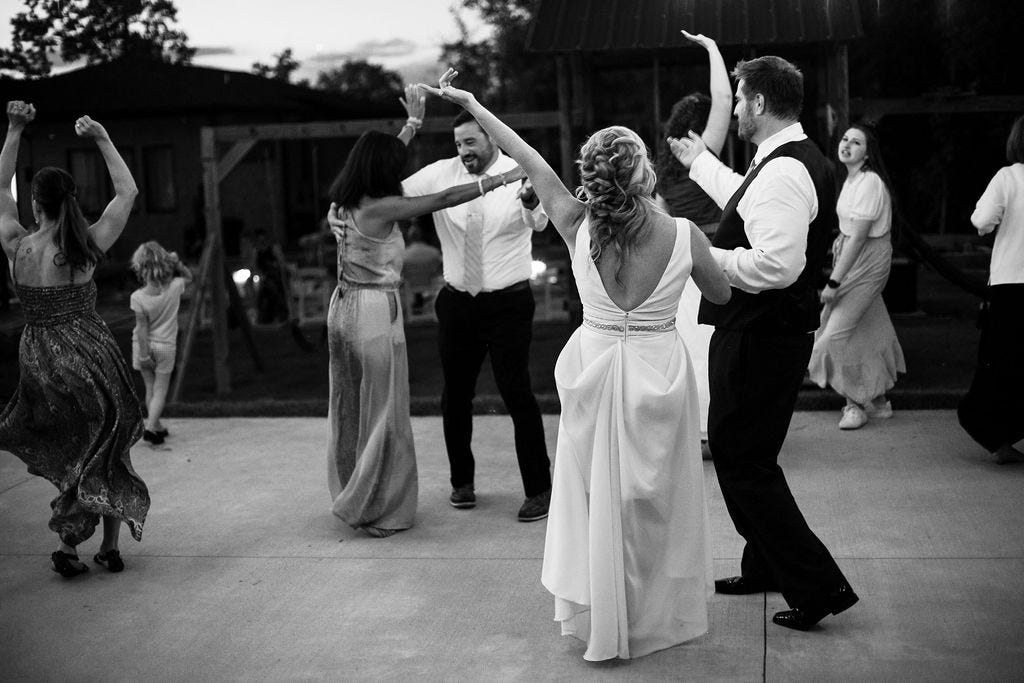
As Joseph and I walked around, greeting guests and sipping champagne, I caught his arm and pointed to the lounge chair where I had lain just days earlier, feeling the weight of the world and acting out the most tragic and beautiful story.
“Do you see that corner? Right there by the big planter?” I asked.
He looked where my finger pointed.
“There lies a great warrior.”
I had already told him the whole story. He knew what I meant. He wrapped his arms around me and gave me a kiss. “But… I kinda liked her.” he said.
“So did I,” I said. “But it’s time for her to grow into something… bigger.”
It’s been a year since that mind-altering trip. I’m happy to report that my integration of that very intense experience has been… well… Let’s be honest. It’s been imperfect, clunky, and awkward. Why am I happy about that? Because it’s real. Plant medicine is not a silver bullet. Nor is it a guarantee that your life will magically change overnight. (Although I do know some people, including Joseph, who have experienced lasting healing from depression in a single therapeutic dose.)
My good friend Dana with the buddha smile calls it a pattern interruptor. We are still learning about the many ways in which these fungi, with which humans have co-evolved for thousands of years, actually work. But we know from scientific research that psilocybin alters brain waves, neuron firing, and communication across different parts of the brain, temporarily disrupting the function of the “default mode network” and making the brain more receptive to new information and less dependent on established habits and beliefs. Research also suggests that it also increases neuroplasticity, or the ability of the brain to continue to change and learn new things.
Which is why what happens after a trip, in the period we call “integration,” is even more fascinating to me than the actual trip itself.
Let’s take it back to that ski slope covered in fresh snow. Michael Pollan uses the phrase “shaking the snow globe” to describe that smoothing of the ruts that keep us in maladaptive behaviors and beliefs. Both ideas speak to the opportunity we have in the weeks and even months after a therapeutic dose to create new neural pathways, new habits, and new attitudes. From my personal experience, some of those changes unfold naturally, even passively as a result of the new information we encountered in the journey. But some changes must happen more actively and intentionally, especially when it comes to building new habits, patterns, and “spiritual muscles” that then act as a scaffolding for the new life we want to create.
I did not start praying every day. But I did start to stop the personal heroics. I began to take a breath, and then speak out loud these weird, awkward little baby prayers. They sounded something like this.
“Hey. Hey… you. Whoever you are. God. Universe. Something. Whatever. I could just really use a little assistance here, if it’s alright with you.”
The endings of my prayers were equally clunky. I was like a nervous teenager trying to say goodbye to my crush on the phone.
“Ok, well, thanks for listening. Um. And. Yeah. It’s been great talking to you. Thanks… And uh… I dunno. Bye?”
Somehow, God seemed to be able to tolerate and respond to the most indecorous and irreverant of prayers. I even yelled at God this summer when my stepdaughter’s boyfriend died in a tragic motorcycle accident.
“Hey, God,” I said as I lay in bed one morning. “That was really really shitty. And I’m just saying right now, that you had better show up for Mary. Not that I can do anything about it, but I’m just saying.”
I still don’t know what I think about prayer, especially knowing that bad things happen and sometimes prayers aren’t answered. I still don’t understand why or whether God cares that we ask. Maybe someday I’ll understand why some people aren’t miraculously saved from suicide or healed from cancer, even with the sincerest of prayers. Maybe God/The Universe/Whatever is less of a vending machine, and more of a force that moves, connects, and supports every living thing, composting all of our experience—the good, the bad, and the ugly—into something useful and beautiful.
Postscript
A week after our wedding, I received a message on Facebook from a woman named Jessica Fitzmaurice. She had found me in a Psychedelic Facebook Group and noticed that we had a mutual friend. Within a week, Jessica and her husband Jake were on our back patio, sharing a beer and talking mushrooms. But Jessica’s story had not ended as happily as mine.
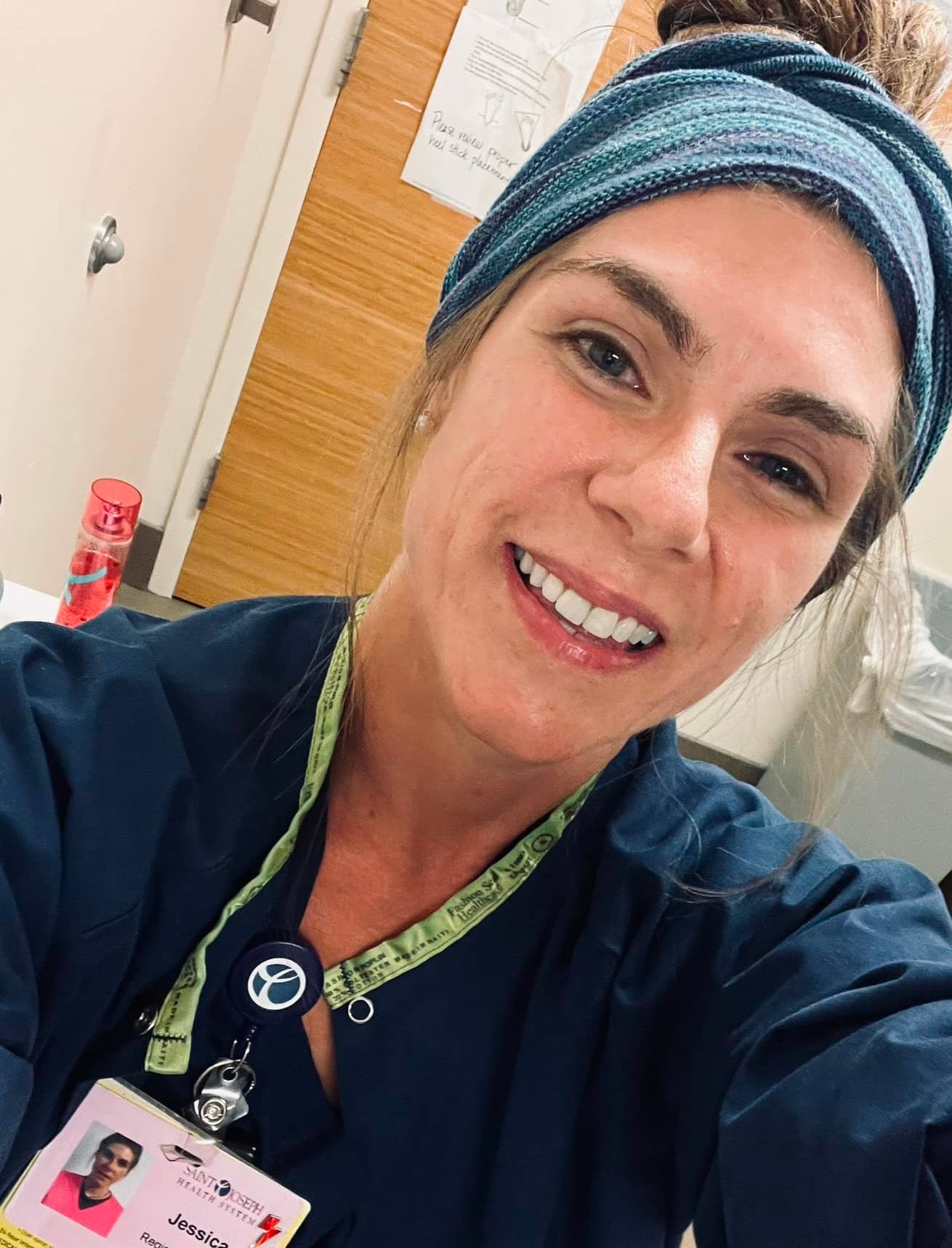
In 2021, Jessica, a NICU nurse and mother of five children had just returned home from a night shift in her hometown of Huntington, Indiana. Without warning, several police officers in hazmat suits broke down her front door and held her at gunpoint. She was arrested and tried for criminal possession and manufacturing of a controlled substance with intent to distribute.
Her actual crime? She grew some psilocybin mushrooms for her own personal use and mental health. She had battled treatment-resistant depression for twenty years, having tried over twenty different pharmaceuticals, and still struggling with suicidal ideation. Desperate for a solution, she did her research and began microdosing. For her, the results were dramatic.
She said, “I was able to mentally move on from what had previously held me back. I felt less pressured, less anxious, and actually curious about the possibilities that lay ahead. I started doing the things I loved to do.”
Like me, Jessica thought that the risk was small and manageable.
“I was so desperate to feel better and the research was so positive that I gave very little thought about the legal implications of growing psilocybin mushrooms for microdosing,” she admitted. “I was only focused on the potential benefits. I believed in the sincerity of what I was doing to save my life.”
But in a cruel turn of local law enforcement roulette, she was arrested, tried, found guilty, and staring down the barrell of ten years in prison.
Miraculously, the psychedelic community caught wind of her plight, and an attorney from Ohio, who was, himself, a fellow fan of psychedelics, stepped in to help with her defense. You can read the rest of her story here.
As Joseph and I listened to Jessica tell her story, the sobering realization hit me like a ton of bricks. I could have been her.
So how did Jessica and Jake end up in NW Arkansas? Even though Jessica narrowly escaped a ten-year prison sentence, which was reduced to house arrest and probation, Huntington, Indiana had become a hostile and painful place for her, so she and Jake, both avid mountain bikers, hand-picked NW Arkansas, as a new home and a fresh start.
As Jessica and Jake embarked on their new life here, their resilience transformed into a shared mission—one that my husband and I were honored to join. Together, the four of us founded Decriminalize Nature NW Arkansas, a homegrown movement to decriminalize entheogenic plants and fungi in the Heartland.
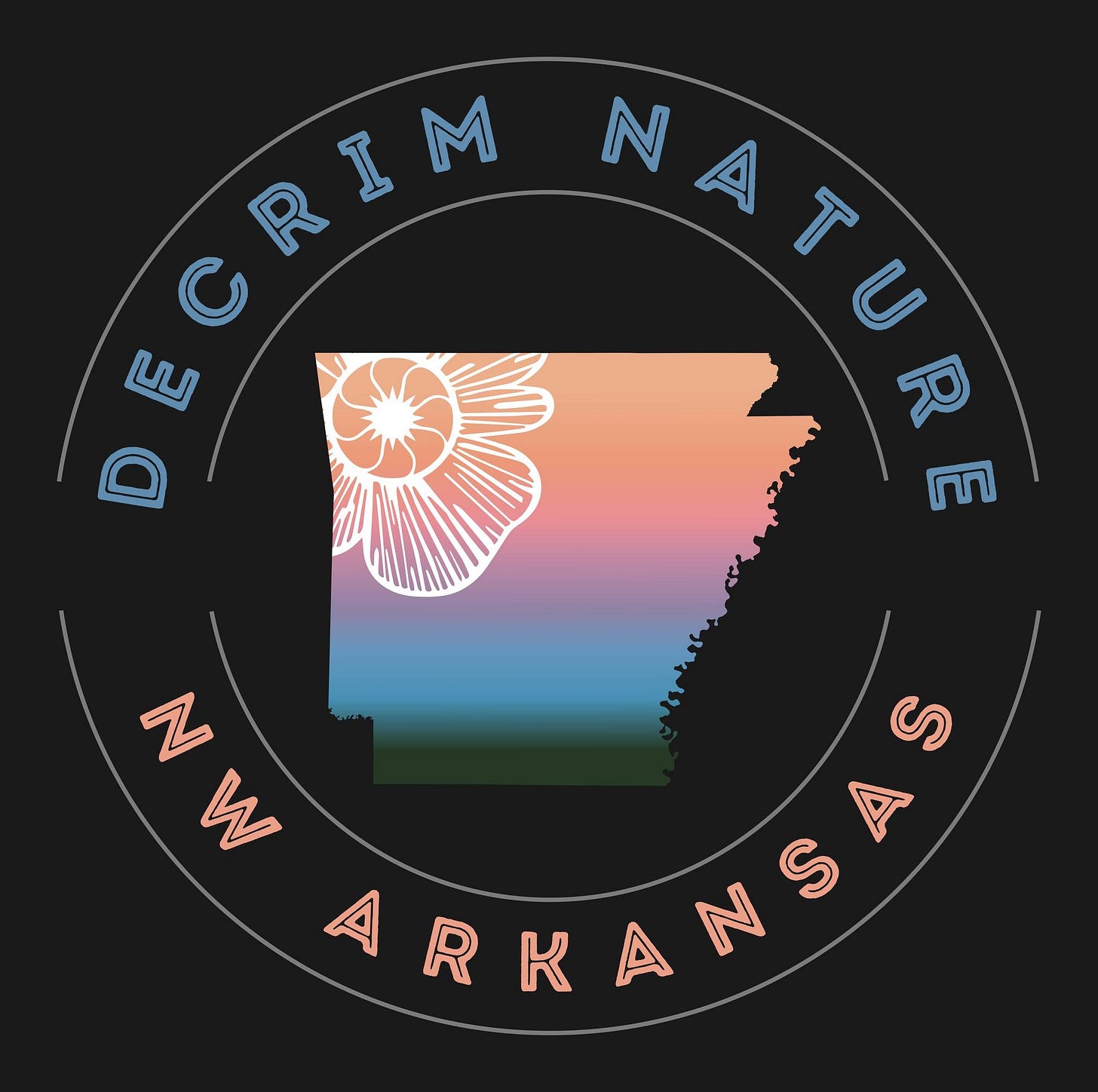
We are currently working to build our coalition and to develop relationships with local city council members with the goal of deprioritizing for local law enforcement the arrest and prosecution of individuals who grow, gather, and gift plant medicines for personal use. This has already been done in over twenty cities across the US through a loosely organized, open-source mycelial movement called Decriminalize Nature National, and we hope to join that steadily growing number.
On April 20th, 2024, Jessica’s probation ended, and about a month later, her felony conviction was reduced to a misdemeanor. Jessica can work again as a registered nurse, but her passion has grown past the NICU. While she was on probation, she spent the “time off” getting trained and certified as a psychedelic facilitator through Psychedelics Today’s Vital Program.
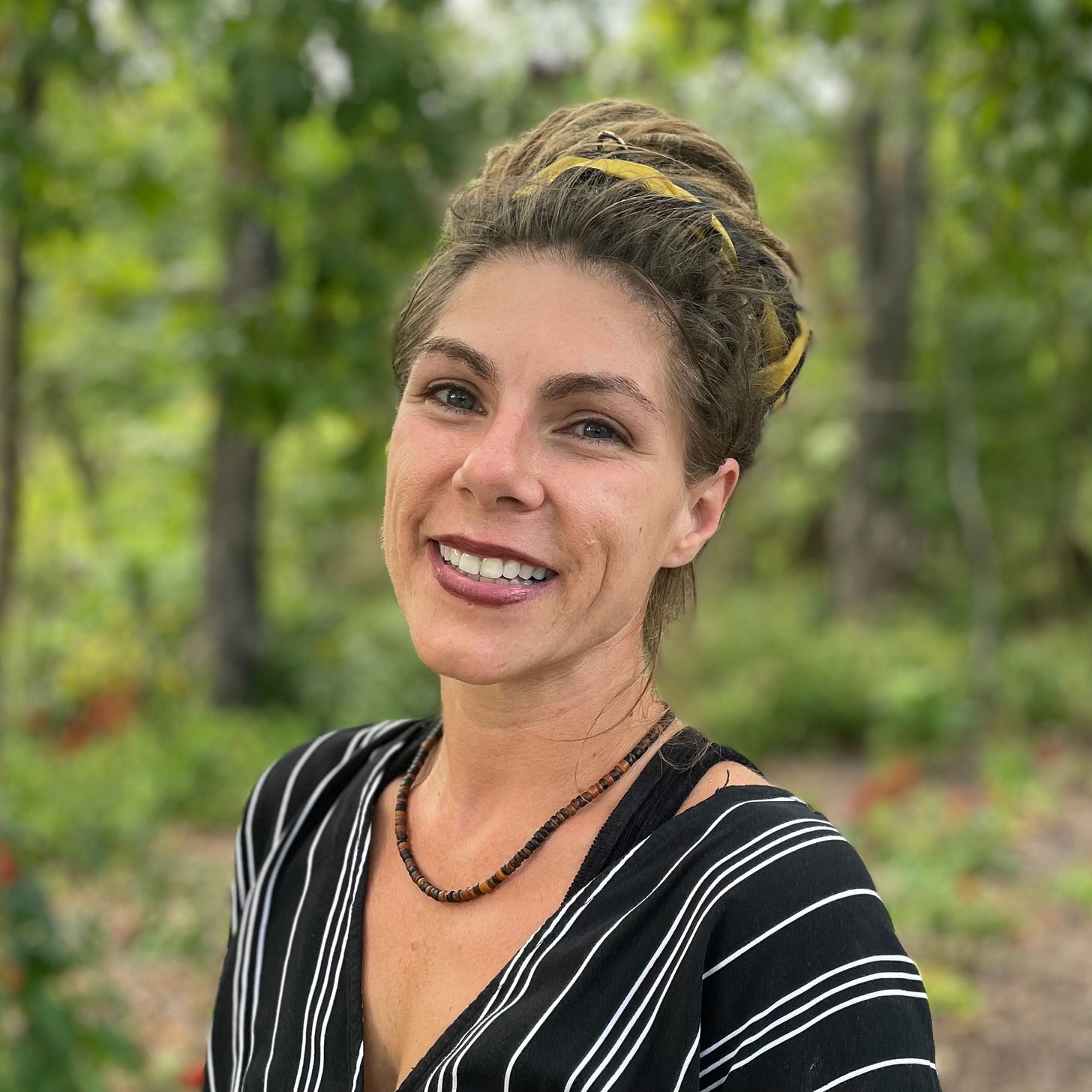
Jessica’s journey is a stark reminder that the pursuit of healing, while deeply personal, can intersect with the harsh realities of an unforgiving legal system. Her story shines a light on the need for reform and inspires us to work towards a world where healing is a right, not a crime. Jessica’s hard-won freedom fuels our resolve to change the narrative surrounding plant medicines, shifting it from criminalization to understanding, from punishment to support. As we continue this work, we are reminded that each step forward is not just for us but for everyone who has suffered in silence.
